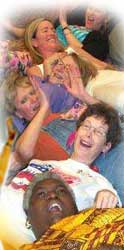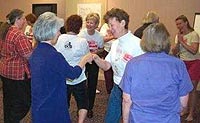The Rediff US Special/ Aseem Chhabra


Last fall, Bobbe White was intrigued by an Internet newsletter that talked about a laughter therapy training session to be held in St Louis, Missouri.
"I had to go," says White, a business development officer at the State Street Bank and Trust Company in Quincy, Illinois. "I am a little impulsive."
When her employer refused to pay for the course, she decided to go for it anyway, for the fun of it. It helped that the nine-hour training session was scheduled on a weekend.
White returned from the session rejuvenated. Convinced it was no laughing matter, she decided to introduce the therapy to her colleagues at the bank. But before that, she praticed it on her nine-year-old son.
"He was amazing," she says. "He turned into a little laughing butterfly. He was on the floor. A pretty reserved kid, now he was dancing around. When I saw the effect on him, I knew it was something special. My daughter, who is 12, on the other hand, thinks it is boring and stupid."
The session White had attended was conducted by, among others, Steve Wilson, a Columbus, Ohio-based retired psychologist and a self-proclaimed "joyologist." He's also the Cheerman of the Bored of the World Laughter Tour Inc -- an organization that follows the laughter therapy principles developed by Dr Madan Kataria in Mumbai.
There are as many as 500 laughter clubs in India; members meet early in the morning on beaches, in parks, schools and offices. There are branches in Europe and Australia, and now, they are mushrooming in North America.
For the last three Fridays, White has officially run the club with about 10 colleagues. The sessions are held early in the
morning for 10 minutes (although some clubs have 30 to 40 minute long sessions, including yoga breathing exercises) in the basement of the old bank building.
The attendance has been relatively low, White says, but that has to do with people's comfort level. Some people simply do not like to laugh out loud in the presence of others. "But the rest of them can hear us laugh. And they can laugh at us. They know what we are doing and they think it is funny. So they get the benefit as well."
An organized laughter club setting is highly beneficial for a stressful work-related situation, she says.
"You can feel the tension dissipate. It gives you a wonderful start of the day, because most people come to work and they have already put in a full morning of work at home, getting the children ready. I have one woman in the group who last week said to her daughter: 'Erica, you will have to ride the school bus tomorrow, because I am going to laugh.' "
Wilson has prescribed laughter for over 20 years. "It is a perfect antidote for stress," he says. "With laughter your blood pressure goes down to normal. Your muscles relax. Your immune system is activated and you are more resistant to viruses and bacteria. You digest and sleep better. And you get more oxygen to every organ of your body."
His connection with laughter clubs goes back to 1998, when he was invited by a business group to present management seminars in India on how to create a positive work environment. At the same time he was trying to locate Dr Kataria and get information on his laughter clubs. They finally spoke on the phone.
"We immediately connected and were jumping up and down for joy," says Wilson. "It was like we were soul mates."
Wilson visited Dr Kataria in Mumbai and saw the numerous laugher clubs in operation. "I was astounded, because I recognized that nobody had a systematic routine for laughter the way he (Dr Kataria) did," says Wilson.
"A laughter club session is methodical. There is a routine of laughing, and stretching and breathing that comes from yoga. There is a beginning, a middle and an end, with plenty of room for fun and creativity."
When Wilson realized that Dr Kataria had never been outside India, he invited him to the US. Eventually with the help of a colleague, a registered nurse, Karyn Buxman, and the American Association for Therapeutic Humor, Wilson arranged a 14-city tour for Dr Kataria in 1999.
They visited hospitals, physicians, businesses, senior citizens, court committed delinquent youth and elementary school children. At each stop, Dr Kataria would introduce the idea of a laughter club and provide basic training.
With Dr Kataria's visit Wilson and Buxman officially launched the World Laughter Tour. They have since trained 85 laughter leaders who have gone back to start their own clubs.
White says training, though essential, was not rocket science. "There is a right way to make it work," she added. "But it's so simple, it's silly. But that's the beauty of it."
Wilson sees one big difference between the way laughter clubs operate in India and in the US. "In India it is very much a community activity and it is much more acceptable if the leader of your laughter club is your local merchant or your neighbor," he says.
"In the US we work on a different model. We have training programs and workshops. Here when we talk about laughter therapy, people want some kind of approved training. I guess each culture will have to make its adaptations."

According to him, the concept is spreading in the US. Training sessions for the club are now officially recognized by professional boards representing nurses, activity and recreation therapists, and social workers.
Her first session at the State Street Bank resulted in invitations to present the concept of the club to schools, day care counselors and United Way chapter in Quincy, recalls White.
Last fall, Wilson was invited to the Museum of Natural History in New York City for the premiere of film-maker Mira Nair's documentary The Laughing Club of India. After the screening, Wilson invited the audience on stage and held a laughter club demonstration. Questions were raised about how to start laughter clubs in New York.
Soon two laughter clubs will launched in the Greenwich Village section of Manhattan. On May 6, Wilson's group will co-sponsor with the two clubs World Laughter Day (a concept first started by Dr Kataria in India) in the Washington Square Village. "It is a day to send a message of peace," says Wilson. "If we have the right kind of laughter in our hearts, we won't be going to war. "
Dr Kataria had 12,000 people attend the first World Laughter Day in India, "so by that count we can expect 3,000 people," he adds, laughing.
Design: Uttam Ghosh
RECENT SPECIALS:
The frog-in-the-well syndrome
Visionary Zeal
The Fossil Fanatic
There is life after dotcom death
Washington Chalo!
Lessons from Long Island
Back to top
Tell us what you think of this feature